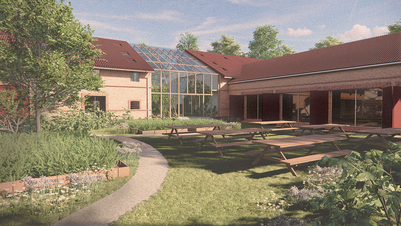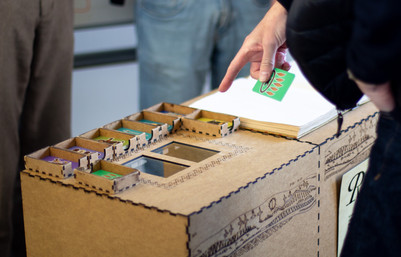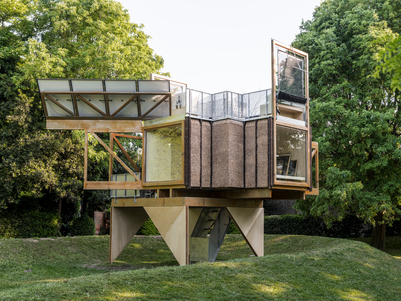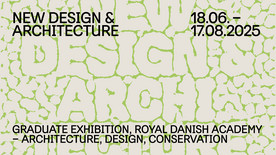
The Shared Planning Course
The Shared Planning Course (Læreanstalternes Fælles Byplanskursus) is an interdisciplinary urban planning course that addresses the relationship between urban development and global challenges such as climate change, biodiversity loss, and social segregation. Initiated by students across Denmark's higher education institutions, the course promotes cross-disciplinary approaches to urban planning and related fields. Hosted by the Royal Danish Academy - Architecture, Design, Conservation, the course is more relevant than ever, offering a comprehensive introduction to the field through lectures and readings, while most importantly providing students the opportunity to apply their skills and knowledge in collaboration with peers from diverse disciplines.
Spring Term 2025
Royal Danish Academy – Institute of Architecture, Urbanism and Landscape
4th February – 14th March 2025
Lectures, Readings, Discussions, Group Project Work
Language: English
Level: Master
Credits: 10 ECTS
The course consists of approximately 80 hours of lectures and preparation (with around 250 pages of literature) and approximately 120 hours of project work and workshops.
Course Capacity: 40 students
Requirements: Open to all students enrolled in a master’s program related to urban planning.
Course Leader: Gustavo Ribeiro
Supervisors: Gustavo Ribeiro, Johan Mottelson, Jonna Krarup
Teaching Structure: Full-time teaching block from 4 February to 19 February, including lectures, reading, and group discussions. Supervised project development from 20 February to 7 March.
Report: Group project report (4 students per group) of 7-10 pages per student (approximately 3,600 characters per student). It should include a problem statement, analysis of a selected urban case.
Examination: Assessment will be based on interim assignments, oral presentations, and an overall evaluation of hand-ins and the course project.
Marking Scale: 7-point grading scale.
Censorship Form: Internal censorship.
Introduction
Introduction
The LFB study programme aims to explore the impact of economic, societal, and environmental dynamics unfolding at a global level on spatial transformation at a local level – namely, in Copenhagen and its metropolitan region.
The programme comprises a series of lectures dealing with broader socio-economic processes such as the competition state, globalization, regional spatial transformation, social inequality amongst others, combined with discussions on how such processes have an impact at a local level. The course will provide a discussion of a case studie in Copenhagen, namely Nordhavn.
Through inter-discilinary perspectives, we intend to give students insight into complex processes of urban transformation and how urban development approaches are implemented through concrete development projects. Furthermore, we intend to explore how landscape, space, place, materiality, and infrastructure can be instrumental in urban development projects, how they are understood, conceptualized and engaged in urban planning and design.
Themes
Themes
The following issues will be explored through the discussion of selected urban development cases:
- Global challenges and urban development: Climate change, biodiversity decline and social inequality
- The Anthropocene: New perspectives on landscape architecture and urban geography
- Urban reconstruction after man-made disaster
- Urban metabolism: Energy consumption and transition to a green economy
- Processes of change as a result of deindustrialization and urban restructuring
- Governance and strategic urban planning
- Urban economics and financial models for urban development
- Social polarization and conflicts associated with urban development and gentrification
- Community participation and co-production approaches to urban planning
Pedagogical Approach
Pedagogical Approach
The promotion of cross-disciplinary collaboration is central to this study programme. It will be promoted through project work throughout the course and through peer-to-peer learning, where students can share analytical and project development methods and approaches.
A programme of lectures based on selected themes and literature will form a theoretical and methodological basis for project work. In addition, the lectures will focus on the presentation and discussion of selected urban development cases (Nordhavn) through a multi-actor perspective. In this way, we intend to introduce students to a discussion on urban development related to the complex processes and conflicting agendas and how strategic planning can be a tool to deal with such complex scenarios and promote urban quality. Lectures will be followed by discussions, based on literature study, which students will be asked to prepare and present in groups.
Analytical work will be based on a flexible and open framework which supports problem-based project development and learning.
Course sessions are organized as a combination of lectures and discussion in the morning and preparation, project work and supervision in groups in the afternoon.
Analytical work will be based on a flexible and open framework which supports problem-based project development and learning.
Learning Outcome
Learning Outcome
Students on completing LFB will achieve the following.
Knowledge about:
- The impact of global economic, political, societal, and environmental dynamics on urban transformation
- The role of landscape as a structuring element in urban development
- Urban transformation approaches involving water systems and infrastructures
- Importance of the spatial and physical / material dimension in urban planning
- The role of urban communities in urban development
Skills:
- Participating in interdisciplinary work in urban planning based on complex urban challenges
- Critical thinking and methods for analyzing and communicating current urban challenges
- Acquisition of tools and methods within strategic urban development
Competencies with:
- Using tools and methods to analyze complex urban and landscape contexts
- Connecting urban planning theories with the urban spatial transformation and development
- Analysing agendas of urban development and urban planning actors
- Development, presentation and analysis of concrete proposals for urban transformation
- Analysis of complex spatial contexts and their political, social, and economic contexts and implications
Application
Application
Fill in the application form and enclose a one-page motivation for why you want to participate in the course, documentation for your education background and a prior approval from your study board.
If the number of applications exceeds the number of available places on the course, the course leader will make a selection of the participants in view of achieving interdisciplinarity in the study groups.
Application deadline: 15th of December 2022












